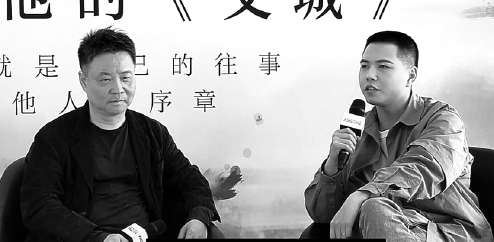WRITER'S REPUTATION LIVES ON 85 YEARS AFTER DEATH
Influential Lu Xun triggers hot debate on social media

In the days before he died in October 1936, Lu Xun, regarded by many as the father of modern Chinese literature, continued to work despite being seriously ill.
But unlike his work during the previous two decades, when he mainly wrote to raise awareness of the need for a better China, in one of his last pieces, This is Also Life, he recorded his feelings after recovering from a dangerous illness.
"The lamplight in the street shines through the window, dimly illuminating the room. I take a glance around, the familiar walls, their edges, the familiar stacks of books, the unbound picture album, the night going on outside, the world far away, and millions of people. I can relate to them all."
Many Chinese still love to quote the last part of that passage.
Lu's essays and short stories are selected for textbooks, but primary and middle school students, many of whom are unable to understand the essential ideas of his work, are often required to recite entire passages written about a century ago in a style they find challenging.
However, 140 years after his birth, Lu's name often features on social media platforms, as people love quoting him-falsely in numerous cases.
As a result, the Lu Xun Museum in Beijing created a search engine to help readers verify Lu's quotes, which have become a hot topic on Sina Weibo.
Photographs of the writer and quotes falsely attributed to him have been used as humorous stickers on WeChat.
On the Taobao shopping platform, an image of Lu in the television series The Age of Awakening, which aired in February, has been so popular that 16 pages of related cultural creative products are available including badges, keyrings, bookmarks, cutouts, stickers and T-shirts.
Born on Sept 25, 1881, Lu resonates with young people in different ways.
In late February last year, Wu Yifan, who at the time was a 21-year-old finance student at Peking University, posted a video of a rap song he wrote based on 16 prose poems from Lu's Wild Grass collection. The song soon became a hit on the Bilibili short-video platform.
Wu spent Spring Festival last year in his hometown of Shihezi, Xinjiang Uygur autonomous region. He became bored with being cooped up indoors, so he started rereading Wild Grass, which he had read many times since leaving middle school.
"I had previously reread my favorite passages, paying a lot of attention to the language and writing style. However, last year, after reading the entire collection, I noticed the general tone was anguished. I could sense Lu's disappointment and despair, which I hadn't felt so profoundly before," said Wu, now a graduate student at Fudan University in Shanghai.
When Lu wrote the poems in Wild Grass from December 1924 to January 1926, he was living in Beijing, which was ruled by the Northern Warlords (1912-27). The future for China at that time was unclear.
"Wild Grass is a reflection and analysis of Lu Xun. It describes his struggles to find hope amid despair. My admiration for him grew after I understood this background," Wu said.
Shadow's dilemma
Using images from each of the poems in Wild Grass, such as Haode Gushi (The Good Story), Yingde Gaobie (The Shadow's Leave-Taking), Qiuye (Autumn Night) and Sihuo (Dead Fire), Wu wrote lyrics to tell a story of his own.
The story starts with a shadow saying farewell to its master. The shadow then faces a dilemma when it disappears in light and in darkness. Despite experiencing anguish and despair, it soldiers bravely on.
"I wanted to use the song to convey the tone of the prose poem collection," Wu said.
After completing the song, but feeling pessimistic about it, Wu did not show it to anyone. "Who would listen to such a boring song and understand its symbolic meanings? For many people, life has been exhausting, but music often provides a means of escape," he said.
Despite Wu's misgivings, the song went viral in March last year, as the COVID-19 pandemic took its toll.
"I don't know how people understood the song, but maybe they could sense the need to keep fighting amid despair," Wu said.
A video of the song has been played more than 9 million times on Bilibili, attracting over 16,000 comments. When Wu sings the words "I felt despair, I felt exhausted, I met young people no more", many comments quoting these lines move across the screen.
Wu said: "Lu's works encourage us to think. I don't like quoting him blindly and simply using some of his words to criticize current social issues. Rather, we should read him to understand his works against a historical background.
"That's why I wrote a comment stating that I hope people won't deify Lu. The most important thing is to really read his works."
Faults analyzed
For Deng Jiahao, 25, who is known as Zhineng Luzhang on Bilibili, where he is followed by more than 2.6 million people, the most important thing he has gained from reading Lu's works and making videos about him is understanding the writer's way of thinking.
"Many people say Lu Xun was an angry critic, always laying into people harshly, but he was not in any way extreme. He always thought about problems in a comprehensive manner," Deng said.
"In his day, many people wrote articles criticizing Lu. In response, he first read these articles thoroughly, analyzing the faults in each sentence carefully and using his rivals' words to fight back.
"Nowadays, people criticize each other before reaching any degree of mutual understanding. That's something we can learn from Lu Xun."
In the 12 months since Sept 20 last year, Deng posted 26 videos about the writer and his works. The videos have been watched more than 36 million times.
After graduating from a technical secondary school, Deng felt he was losing his way at age 20, when he ran a business. To escape his troubles, he started reading Ernest Hemingway's The Old Man and the Sea.
"I burst into tears reading the book, and have been reading consistently since then. The book gave me a lot of strength," he said.
Deng posts videos on Bilibili about topics that interest him, such as video games, making money, and reading.
He said that even though it is 85 years since Lu died, he is still a hot topic online and is frequently quoted. In 2019, Deng started reading short stories and essays by Lu, and last year created his first video focusing on the extent of the writer's talent.
"At first, I only planned a single video, but as the footage was surprisingly popular, I decided to make more films about Lu," he said.
When Deng studied the writer's works at primary and middle school, he found them vivid and humorous, but difficult to understand. But reading him at age 23, with a bitter experience of life, things were quite different.
Born toward the end of the Qing Dynasty (1644-1911), Lu lived through the 1911 Revolution and China under the rule of warlords. Witnessing chaotic times, he wrote many works focusing on social issues.
Deng said, "Many people hear of his quotes, but know little about the background of his works. I guess that's why they watch my videos."
To make the videos, Deng read some 30 academic works published in China and overseas about the writer and his work.
Lu is not viewed as being outdated "because his criticism touches the core of human nature, which does not change over time," Deng said.
Thanks to the videos, Deng has attracted some 500,000 followers, one of them being Yu Hua, author of To Live and Chronicle of a Blood Merchant, who is a big fan of Lu Xun.
Yu has said on many occasions, including a dialogue with Deng at an event on April 23 to mark World Book Day, that Lu was the only writer he used to dislike, because studying his works at primary, middle and high school, he could not understand him properly. He "fell in love "with Lu at age 36.
Already an established writer, Yu was asked to work on a film script adapted from Lu's short stories, and started reading a book by the author that he had left untouched for more than 10 years. Reading the first story, Diary of a Madman, he was captivated by the writing.
Debate on whether Lu's works should be removed from Chinese textbooks for primary, middle and high school students has been a popular topic online for some time. Many people, including Deng, support the idea, as it is hard for children to understand the writer, but easy to shun him due to the challenges his work poses.
However, for Hou Xiaotong, 27, a Chinese-language teacher at a middle school in Beijing, although giving lessons about Lu is demanding work, it is also exciting to discuss one of her favorite writers in class.
"At primary school, students get to know about Lu, and at middle school, they study at least one work by him each semester-an essay or a short story such as the classic Kong Yiji," she said.
Hou, who studied modern Chinese literature at university, said Lu was a very important modern writer.
"Every time we teach students about Lu Xun's works, my former classmates, many of whom have become teachers, and I work really hard and carefully, trying our best to present him positively and introduce him from our hearts in the hope that students can warm to him, or become interested in him," she said.
Social problems
However, for middle school students, Lu's works are too long, his language is difficult, and he always reflects major social problems in small detail, all of which make him a challenging prospect.
Lu's characters lived in a poor and backward China a century ago, struggling to survive among callous natives. In comparison, teenage students now live in a modern country in the internet age and are used to reading stimulating fiction online.
Hou is working to find ways in which students can connect with the characters in Lu's stories.
For example, she came up with the idea of talking specifically about the female characters in his works, such as the most traditional ones, those who want a divorce, or don't want to divorce, and "new women", who accept Western ideas about relationships and life, but struggle when faced with "overwhelming feudalistic forces".
She also tries to inspire students to ask interesting questions about the writer, and reminds them of the names he gives his characters, such as Red Nose or Blue Skin-colors that indicate abnormal mental conditions.
"It's great when I discuss the writer I love with students in class. It is especially rewarding when students who are initially not interested in literature, or think that Lu's work is boring and heavy going, finally become interested in him," she said.
"For one thing, he was a great stylist and storyteller. For another, readers can see how such an incisive and open-minded writer reflected on the world. Moreover, Lu Xun observed many subtleties about human nature, which young students don't understand, but will appreciate when they reach adulthood," she said.
Hou said that although Lu represents "only a small and weak fire in the darkness, he gives people hope. He is a night watchman for Chinese culture, a clear mind in a chaotic world, and a great participant and witness of his time."
She also loves Lu for his frailty, sensitivity and courage.
"People close to him often said he was gloomy, perhaps because he was sick. Sometimes, he wrote that he woke from dreams and felt empty. He was fragile, but not weak," Hou said.
"Although he was in pain and sad, he would pull himself together and fight despair. That frailty and toughness as a human being is very charming and touching."
At university, Hou's tutor made these comments about Lu: "Many people say they don't like Lu Xun because he is boring, or his works are not good enough to show how unique they are. But they should read him before taking such a stance."
Hou added, "At different ages, you can always find something new from his works that will touch or grab you."




Today's Top News
- Dialogue in Madrid matters as talking is always better than not: Editorial flash
- China congratulates Sushila Karki on becoming prime minister of Nepal's interim government
- US chip companies allegedly dumping in China with 300% margin
- Xi, Liechtenstein's hereditary prince exchange congratulations on 75th anniv. of ties
- Xi, president of Swiss Confederation exchange congratulations on 75th anniv. of ties
- FM calls for peace and multilateral cooperation






























